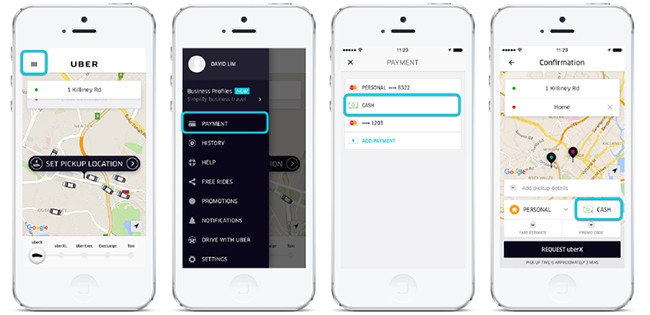
South African Uber riders will, from next week Thursday, have the option to pay cash when using the service.
SA will be the first country in Uber's global network to experiment with cash payments across five cities simultaneously.
The company says this has been tested in other markets and was found to be very successful. Cash as a payment option will be available from the end of next week to South African Uber passengers.
Uber SA drivers are being trained on how the new system will work.
Uber Sub-Saharan Africa GM Alon Lits told ITWeb in an interview this morning that not much will change from the rider's perspective. Users will need to add cash as a payment option in the app, then hail the car as usual, and at the end of the trip the driver will ask for the amount owed.
The prices will remain the same as when using a credit card, but will be rounded down to the nearest rand to prevent finicky change issues.
"We hope this will make Uber accessible to more people who couldn't or wouldn't use the service before," says Lits, referring to people who either don't own a credit card or those who are sceptical about giving out their credit card details. For example, students or much older consumers.
Uber already accepts cash in Kenya, Nigeria, Egypt, India and Singapore. The company is also testing out the option in Manchester in the UK.
"It emerged out of a need from some emerging markets, like India," says Lits. "But we are now seeing a huge net positive effect on the business."
Lits says Singapore is an interesting example. Credit card penetration is over 90% in the country, and yet when Uber started accepting cash, there was a huge spike in sign-ups. This shows the cash model has potential to work outside of emerging markets, he notes.
Lits says accepting cash does go against one of the core principles of the company. Being cashless was touted as one of the main reasons for using the app.
But Lits says as a technology company, it has to innovate and assess what the market wants. Data from previous tests shows that it works.
Addressing safety concerns, Lits says Uber has partnered with First National Bank so drivers will be able to deposit cash into any ATM at anytime, if they feel they are carrying too much.
He does not anticipate it to be much of a problem though. He point out drivers are already driving around with expensive smartphones to run the Uber technology, and extra cash should not be a problem.
Lits notes the model has worked, without incident, in other African markets.
The cash payment option will be rolled out to 50% of all Uber users next week, with the rest following over the next few weeks.
Run-away passengers
Lits says the company does have systems in place to deal with customers who do not pay, as it does not want to cause altercations between the driver and passenger. So if a driver reports a passenger failing to pay, the passenger will be charged the next time he or she uses an Uber. The rider will have to pay the previous amount before the service can be used again.
Repeat offenders will be banned from the service entirely.
In the same way, Lits says to solve the problem of cancellation fees, the amount will be added to the passenger's next trip. A cancellation fee, of R25 on UberX, is charged to the rider when they 'mess' the driver around. For example, making the driver wait over 20 minutes or providing the wrong pick-up location.
Lits says drivers will not be able to trick the system because the same electronic record exists as with credit card payments.
Also, drivers do not 'hand-in' the cash to Uber at the end of the day. It is theirs to keep if they are the owner of the vehicle, or if they are a driver, to split with their boss. Uber subtracts its fee for the cash payments from the other credit card payments it receives.
Lits says the response from drivers has been largely positive.
Government has been slow in regulating Uber, which has been operating in the country since 2014. However, in March, government announced it will move to approve a Bill to regulate Uber in SA so that the e-hailing service can be regulated by authorities in line with other metered taxi operations.
In addition to regulation and licensing issues, Uber drivers were being intimidated by other metered cab drivers who claimed Uber was stealing their business and operating illegally.
On Monday, transport MEC Ismail Vadi was intimidated by meter taxi drivers when he announced the department would issue Uber drivers with operating licences. Vadi said the city is committed to building an integrated, smart and modernised public transport system, which will include Uber.
Lits says the cash-model may make the service more attractive to the meter-cab taxi drivers looking to move over.
Uber is operational in over 70 countries, with more than a million drivers globally. SA was the first country outside of the US where three cities were operational at the same time.
The e-hailing service has continued to grow in the country. In 2014, there were over one million trips in SA, and in the first half of 2015, there were over two million trips booked.
Share